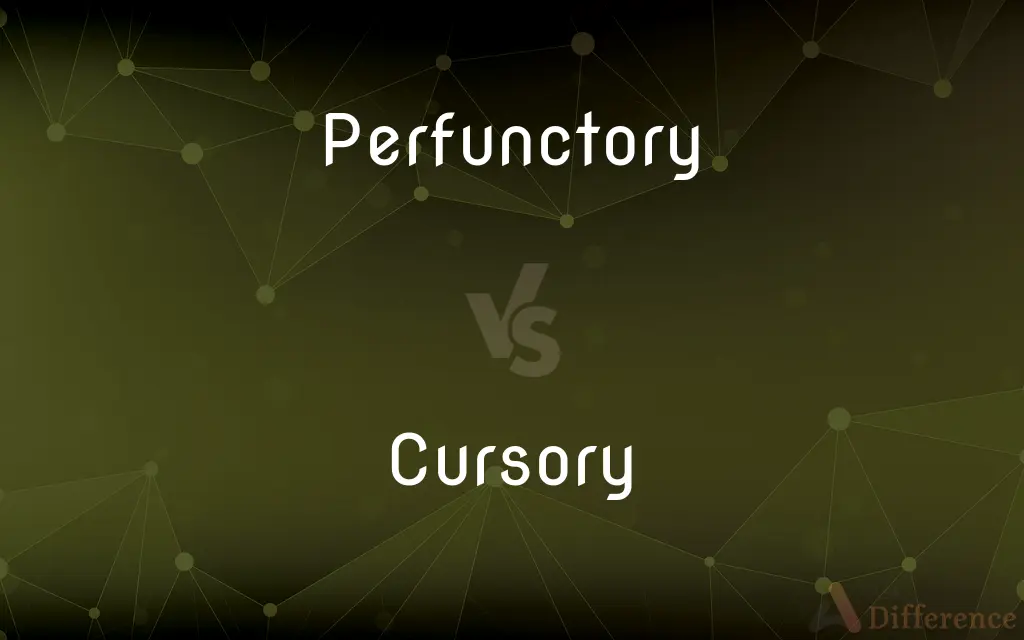Perfunctory vs. Cursory — What's the Difference?
By Tayyaba Rehman & Maham Liaqat — Updated on April 4, 2024
Perfunctory implies doing something with minimal effort or care, whereas cursory means a quick and superficial examination.

Difference Between Perfunctory and Cursory
Table of Contents
ADVERTISEMENT
Key Differences
Perfunctory actions are carried out with a lack of interest or enthusiasm, reflecting a routine or obligatory effort rather than a careful or enthusiastic approach. These actions often suggest a mechanical or automatic response, without genuine care or attention to detail. On the other hand, a cursory glance or examination is done hastily and does not delve deeply into details, implying a quick overview rather than a thorough analysis.
While both terms imply a lack of depth, perfunctory emphasizes the attitude or approach of the person performing the action, suggesting a duty performed without real interest or care. Cursory, however, focuses more on the method or level of detail in the examination, indicating that something is done quickly, with only a superficial level of detail being addressed.
Perfunctory actions can sometimes fulfill the minimum requirements, but they often lack warmth, care, or genuine engagement. For instance, a perfunctory greeting may fulfill social expectations but feels insincere or indifferent. In contrast, a cursory review of a document might overlook important details because of the rapid and superficial examination, even if the reviewer is genuinely interested but pressed for time.
The difference between the two can also be seen in their application in various contexts. For example, a perfunctory inspection of equipment might check off all required boxes without genuinely ensuring everything is in perfect working order, indicating an obligatory approach. A cursory inspection, however, would be a quick look-over, possibly missing details not because of disinterest but due to haste.
Choosing between perfunctory and cursory depends on the aspect one wishes to emphasize: the superficiality of the effort due to lack of interest (perfunctory) or the superficiality of the examination due to rapidity (cursory). Both suggest a lack of thoroughness, but from different angles: one from the standpoint of engagement and the other from the standpoint of depth of examination.
ADVERTISEMENT
Comparison Chart
Definition
Minimal effort, lacking enthusiasm
Quick, superficial examination
Focus
Attitude/effort of the person
Method/level of detail
Implication
Obligatory, mechanical
Hasty, not detailed
Application
Routine tasks, obligations
Reviews, glances
Key Difference
Lack of interest or care
Lack of thoroughness
Compare with Definitions
Perfunctory
Fulfilling a duty with little interest.
He gave a perfunctory nod, barely acknowledging the comment.
Cursory
Quick, without delving into details.
Her cursory review of the document was insufficient for understanding.
Perfunctory
Done mechanically and without enthusiasm.
His apology was perfunctory and lacked sincerity.
Cursory
Brief and surface-level.
They conducted a cursory investigation, leading to incomplete conclusions.
Perfunctory
Routine and obligatory.
The daily safety checks became perfunctory and overlooked real issues.
Cursory
Superficial, not detailed.
The cursory examination missed the underlying problem.
Perfunctory
Carried out with a minimum of effort.
The performance was perfunctory, with no real passion.
Cursory
Hasty and lacking depth.
The cursory summary did not capture the complexity of the issue.
Perfunctory
Showing little interest or care.
Her review of the report was perfunctory, missing key insights.
Cursory
Done quickly and without thoroughness.
He gave the room a cursory glance before leaving.
Perfunctory
(of an action) carried out without real interest, feeling, or effort
He gave a perfunctory nod
Cursory
Hasty and therefore not thorough or detailed
A cursory glance at the figures
Perfunctory
Done routinely and with little interest or care
The operator answered the phone with a perfunctory greeting.
Cursory
Performed with haste and scant attention to detail
A cursory glance at the headlines.
Perfunctory
Acting with indifference; showing little interest or care.
Cursory
Hasty or superficial
Most junk mail requires only a cursory glance.
Perfunctory
Done only or merely to conform to a minimal standard or to fulfill a protocol or presumptive duty.
Cursory
Careless or desultory
The cursory inspection missed several irregularities.
Perfunctory
Performed in a careless or indifferent manner as a thing of rote.
He did a perfunctory job cleaning his dad's car, finishing quickly but leaving a few spots still dirty.
Cursory
(obsolete) Running about; not stationary.
Perfunctory
Done merely to get rid of a duty; performed mechanically and as a thing of rote; done in a careless and superficial manner; characterized by indifference; as, perfunctory admonitions.
Cursory
Running about; not stationary.
Perfunctory
Hence: Mechanical; indifferent; listless; careless.
Cursory
Characterized by haste; hastily or superficially performed; slight; superficial; careless.
Events far too important to be treated in a cursory manner.
Perfunctory
Hasty and without attention to detail; not thorough;
A casual (or cursory) inspection failed to reveal the house's structural flaws
A passing glance
Perfunctory courtesy
Cursory
Hasty and without attention to detail; not thorough;
A casual (or cursory) inspection failed to reveal the house's structural flaws
A passing glance
Perfunctory courtesy
Perfunctory
As a formality only;
A one-candidate pro forma election
Common Curiosities
Can an action be both perfunctory and cursory?
Yes, an action can be both if it is done without interest or care and in a quick, superficial manner.
Is cursory synonymous with brief?
Cursory implies briefness but specifically because of rapidity and superficial examination, not just duration.
Does cursory imply a lack of interest?
Not necessarily; it implies haste or superficiality in examination rather than a lack of interest.
How can educators avoid cursory feedback?
By taking time to provide detailed, constructive feedback that addresses specific aspects of students' work.
Is perfunctory always negative?
Generally, yes, because it implies a lack of enthusiasm or thoroughness.
Can a cursory examination be effective?
It can be, in contexts where a quick overview is sufficient, but it may miss important details.
How can I avoid perfunctory work?
Engage more deeply with your tasks and find aspects of them that interest you to add enthusiasm and care.
What's the impact of a perfunctory attitude in the workplace?
It can lead to uninspired performance, overlooked details, and a general decrease in quality and engagement.
How can one improve from a cursory to a thorough examination?
By taking more time to delve into details and ensuring a comprehensive understanding or inspection.
Can cursory work lead to errors?
Yes, because important details may be missed due to the lack of thoroughness.
Are perfunctory tasks unnecessary?
Not always; they may fulfill essential obligations but are done without genuine engagement.
Is a perfunctory approach acceptable in any scenario?
It might be for routine or low-impact tasks, but generally, a more engaged approach is preferred.
What are the consequences of cursory decision-making?
It can lead to oversight of critical factors, resulting in poor outcomes.
How to recognize perfunctory behavior?
Look for signs of disinterest, minimal effort, or routine completion without engagement.
Why might someone adopt a perfunctory approach?
Due to lack of interest, burnout, or feeling that the task is unimportant or obligatory.
Share Your Discovery

Previous Comparison
Mundane vs. Insipid
Next Comparison
Cap vs. CupAuthor Spotlight
Written by
Tayyaba RehmanTayyaba Rehman is a distinguished writer, currently serving as a primary contributor to askdifference.com. As a researcher in semantics and etymology, Tayyaba's passion for the complexity of languages and their distinctions has found a perfect home on the platform. Tayyaba delves into the intricacies of language, distinguishing between commonly confused words and phrases, thereby providing clarity for readers worldwide.
Co-written by
Maham Liaqat















































